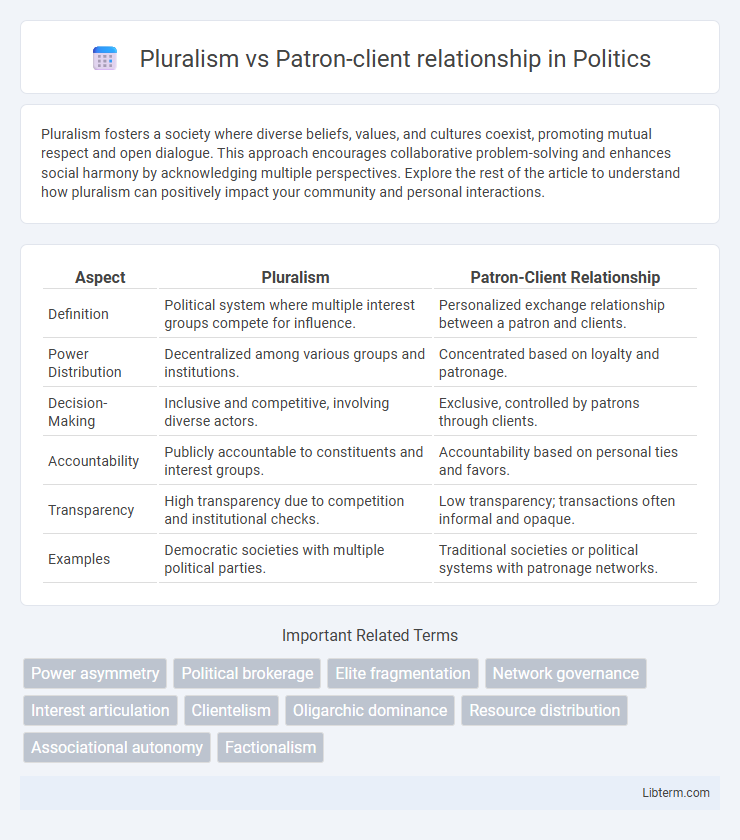Pluralism fosters a society where diverse beliefs, values, and cultures coexist, promoting mutual respect and open dialogue. This approach encourages collaborative problem-solving and enhances social harmony by acknowledging multiple perspectives. Explore the rest of the article to understand how pluralism can positively impact your community and personal interactions.
Table of Comparison
| Aspect | Pluralism | Patron-Client Relationship |
|---|---|---|
| Definition | Political system where multiple interest groups compete for influence. | Personalized exchange relationship between a patron and clients. |
| Power Distribution | Decentralized among various groups and institutions. | Concentrated based on loyalty and patronage. |
| Decision-Making | Inclusive and competitive, involving diverse actors. | Exclusive, controlled by patrons through clients. |
| Accountability | Publicly accountable to constituents and interest groups. | Accountability based on personal ties and favors. |
| Transparency | High transparency due to competition and institutional checks. | Low transparency; transactions often informal and opaque. |
| Examples | Democratic societies with multiple political parties. | Traditional societies or political systems with patronage networks. |
Understanding Pluralism: Definition and Key Concepts
Pluralism is a political theory emphasizing the coexistence of diverse groups and the distribution of power among multiple competing interests within a society. It recognizes the importance of decentralized authority and collective decision-making, allowing various social, ethnic, and interest groups to influence policies. Unlike the patron-client relationship, which relies on hierarchical control and personal loyalty, pluralism promotes inclusivity, equality, and institutionalized channels for participation and negotiation.
Defining Patron-Client Relationships: Core Principles
Patron-client relationships are characterized by asymmetric power dynamics where patrons provide resources, protection, or opportunities in exchange for loyalty and services from clients. Core principles include reciprocity, hierarchy, and personalized exchanges that create enduring social bonds within political and economic structures. Unlike pluralism's emphasis on competing interest groups and formal institutions, patron-client systems rely on informal networks and personalized exchange to maintain influence and control.
Historical Development: Pluralism vs Patron-Client Systems
The historical development of pluralism reveals the growth of multiple power centers and institutions fostering participatory democracy, contrasting sharply with patron-client systems rooted in hierarchical, personalized networks of loyalty and resource exchange. Pluralism emerged prominently in Western democracies through formal institutions and interest groups promoting political competition and accountability, while patron-client relationships have deep roots in traditional societies where social, economic, and political power hinge on reciprocal obligations between patrons and clients. Over time, the expansion of state institutions and civil society in pluralistic systems challenged the dominance of patron-client networks, shaping modern governance models emphasizing impersonal rule of law and institutionalized representation.
Power Dynamics in Pluralist and Patron-Client Frameworks
Power dynamics in pluralist frameworks emphasize the distribution and competition of influence among diverse interest groups within a political system, ensuring no single entity dominates decision-making. In contrast, patron-client relationships centralize power through reciprocal bonds where patrons provide resources and protection in exchange for loyalty and support from clients. This hierarchical structure creates asymmetrical power relations, reinforcing dependency and control rather than balanced participation.
Political Participation: Inclusivity vs Exclusivity
Pluralism promotes broad political participation by encouraging diverse interest groups to engage in policymaking, fostering inclusivity through open competition and representation. In contrast, patron-client relationships often limit political participation to exclusive networks where loyalty is exchanged for resources, reinforcing hierarchical control and exclusivity. This exclusivity restricts access to political power, marginalizing broader societal involvement and perpetuating clientelism.
Impact on Governance and Policy-Making
Pluralism fosters inclusive governance by encouraging diverse interest groups to influence policy-making, leading to more balanced and representative decisions. In contrast, patron-client relationships concentrate power within networks of loyalty, often resulting in governance that prioritizes personal or group interests over public welfare. This dynamic can undermine transparency, accountability, and equitable policy outcomes, impacting the overall effectiveness of governmental institutions.
Social Cohesion and Group Identity
Pluralism fosters social cohesion by encouraging diverse groups to coexist and engage in dialogue, reinforcing group identity through mutual recognition and respect. In contrast, patron-client relationships often create hierarchical dependencies that can undermine broader social cohesion by privileging loyalty to a specific patron over collective group identity. This dynamic may fragment communities, as individuals prioritize personalized alliances rather than shared social norms and values.
Corruption and Accountability: A Comparative Analysis
Pluralism promotes transparency and accountability by encouraging multiple centers of power, reducing the likelihood of corruption through balanced oversight. In contrast, patron-client relationships often foster corruption by creating dependency networks that prioritize loyalty over ethical governance, undermining accountability mechanisms. Comparative analysis shows pluralist systems generally exhibit stronger institutional checks, whereas patron-client frameworks struggle with entrenched corruption due to personalized and informal exchanges of power.
Case Studies: Global Examples of Each Model
Pluralism, exemplified by the United States, fosters a political environment where multiple interest groups compete for influence, ensuring a balance of power and diverse representation. In contrast, patron-client relationships are prominent in countries like Pakistan and the Philippines, where political loyalty is maintained through personalized exchanges of favors and resources, often leading to hierarchical dependencies. These global case studies highlight how pluralism encourages institutionalized competition, whereas patron-client systems emphasize relational networks and reciprocal obligations.
Future Trends: Navigating Between Pluralism and Patron-Client Systems
Emerging political landscapes indicate a complex interplay between pluralism and patron-client systems, where increased digital connectivity fosters broader civic engagement while traditional patronage networks adapt through personalized exchanges of resources and loyalty. Future governance models are likely to blend institutional pluralism with informal patron-client dynamics, requiring nuanced policy frameworks to balance transparency with localized influence. Advances in data analytics and social media amplification will simultaneously challenge patron-client dominance and empower pluralistic governance by enabling more diverse participation and accountability.
Pluralism Infographic

 libterm.com
libterm.com